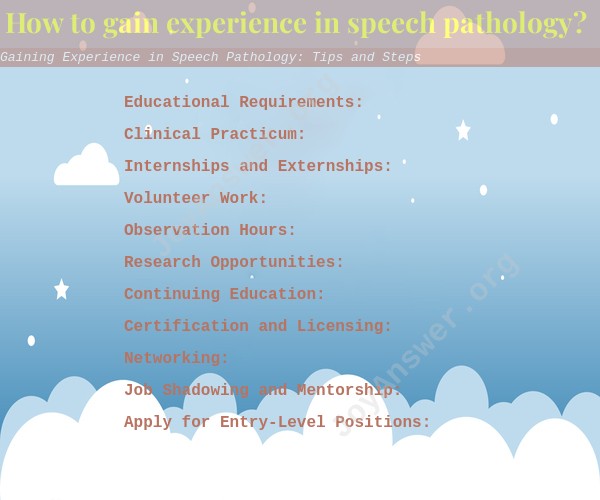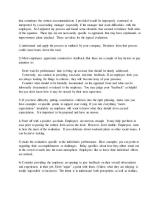How to gain experience in speech pathology?
Gaining experience in speech pathology is essential for building your skills, knowledge, and credibility in the field. Here are some tips and steps to help you gain valuable experience in speech pathology:
Educational Requirements:
- Obtain a bachelor's degree in communication sciences and disorders or a related field as a prerequisite for graduate-level studies.
- Pursue a master's degree in speech-language pathology (SLP) from an accredited program. A master's degree is typically required for SLP licensure and certification.
Clinical Practicum:
- Participate in clinical practicum experiences during your graduate program. These hands-on experiences are typically completed under the supervision of licensed and certified speech-language pathologists.
- Clinical practicum allows you to work with individuals who have speech and language disorders, gaining exposure to assessment, diagnosis, and treatment.
Internships and Externships:
- Seek out internships or externships in various healthcare settings, schools, rehabilitation centers, and private practices. These opportunities provide exposure to different client populations and settings.
- Internships can also help you build professional connections and gain insights into the daily responsibilities of SLPs.
Volunteer Work:
- Consider volunteering at schools, hospitals, or nonprofit organizations that serve individuals with speech and language disorders. Volunteering can help you gain experience, interact with clients, and make connections in the field.
Observation Hours:
- Spend time observing experienced SLPs in various settings. Observation hours can be a valuable way to learn from professionals, understand their techniques, and gain exposure to different communication disorders.
Research Opportunities:
- If you have an interest in research, seek out research opportunities within your academic program or at research institutions. Research experience can be valuable for advancing your knowledge in specific areas of speech pathology.
Continuing Education:
- Stay updated on current research, techniques, and trends in speech pathology by attending workshops, conferences, and continuing education courses.
- Many professional organizations offer resources and events for ongoing learning and networking.
Certification and Licensing:
- Ensure that you meet the requirements for state licensure and professional certification as a speech-language pathologist. Each state has its own licensing board, so familiarize yourself with the specific requirements in your state.
Networking:
- Join professional organizations like the American Speech-Language-Hearing Association (ASHA) and participate in local SLP associations. Networking can help you connect with professionals and potential employers.
Job Shadowing and Mentorship:
- Seek opportunities to job shadow experienced SLPs or find a mentor who can provide guidance and support as you navigate your career path.
Apply for Entry-Level Positions:
- Once you have completed your education and gained relevant experience, start applying for entry-level SLP positions in schools, healthcare facilities, or private practices.
Remember that gaining experience in speech pathology is an ongoing process. The more varied and diverse your experiences, the better prepared you'll be to work with a wide range of clients and conditions in your future career as a speech-language pathologist.
Building a Career in Speech Pathology: Tips for Gaining Experience
Speech-language pathologists (SLPs) are professionals who help people with communication disorders. They work with people of all ages, from infants to adults, and with a variety of communication disorders, including speech sound disorders, language disorders, swallowing disorders, and voice disorders.
If you are interested in a career in speech pathology, there are a few things you can do to gain experience:
- Volunteer at a speech-language pathology clinic or school. This is a great way to get hands-on experience working with SLPs and clients.
- Shadow an SLP. This allows you to observe an SLP in their work setting and learn more about the profession.
- Get involved in research. There are many opportunities for SLPs to get involved in research, which can help you develop your skills and knowledge.
- Attend conferences and workshops. This is a great way to learn about the latest developments in the field and network with other SLPs.
The Path to Becoming a Speech Pathologist: Essential Knowledge and Skills
To become a speech-language pathologist, you must complete a master's degree in speech-language pathology from an accredited program. The program will teach you the essential knowledge and skills you need to practice as an SLP, including:
- Anatomy and physiology of the speech and hearing systems
- Assessment and diagnosis of communication disorders
- Intervention strategies for communication disorders
- Communication disorders across the lifespan
- Professional ethics and practice
In addition to completing a master's degree, you must also pass the Praxis Speech-Language Pathology Examination. This examination is required to become a licensed SLP in most states.
Your Guide to Speech Pathology: What You Need to Know to Succeed
Speech pathology is a rewarding career that allows you to help people improve their communication skills and live more fulfilling lives. If you are interested in a career in speech pathology, here are some things you need to know to succeed:
- Be passionate about helping others. SLPs need to be passionate about helping people with communication disorders. This passion will motivate you to provide the best possible care for your clients.
- Be patient and compassionate. SLPs work with clients who may be frustrated and discouraged by their communication disorders. It is important to be patient and compassionate, and to build rapport with your clients.
- Be organized and detail-oriented. SLPs need to be organized and detail-oriented in order to keep track of their clients' progress and develop effective intervention plans.
- Be able to work independently and as part of a team. SLPs often work independently with their clients, but they also need to be able to work effectively as part of a team with other professionals, such as teachers, doctors, and nurses.
If you have the passion, patience, compassion, organization, and detail-orientedness, then you may be well-suited for a career in speech pathology.













